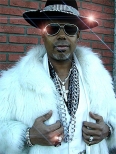Disclaimer: The examples and references given in this post in no way suggest that Shared Hope is promoting the below types of memorabilia. We understand curiosity and investigating on behalf of interest; however, we do not recommend the purchase of such items, which could in turn endorse the commercial sex industry.
 Jay-Z’s catchy hit from 2000, hasn’t lost any novelty during its ten year run in the music industry. It even costs $1.29 on iTunes—the price reserved for only the most popular songs within the virtual-jukebox—instead of the standard $.99. In a culture where pimps are idealized as wearing bright orange top-hats, luxurious furs and sporting fancy canes, who wouldn’t want to be “doin’ big pimpin’ up in NYC”? I offer two basic reasons why becoming a pimp can be so appealing in 2010, but please remember, my rudimentary analysis is by no means exhaustive. I simply suggest that the promise of being cool and making lots of money can be a deadly combination that has created an enticing outlet for the up-and-coming commercial sex entrepreneur.
Jay-Z’s catchy hit from 2000, hasn’t lost any novelty during its ten year run in the music industry. It even costs $1.29 on iTunes—the price reserved for only the most popular songs within the virtual-jukebox—instead of the standard $.99. In a culture where pimps are idealized as wearing bright orange top-hats, luxurious furs and sporting fancy canes, who wouldn’t want to be “doin’ big pimpin’ up in NYC”? I offer two basic reasons why becoming a pimp can be so appealing in 2010, but please remember, my rudimentary analysis is by no means exhaustive. I simply suggest that the promise of being cool and making lots of money can be a deadly combination that has created an enticing outlet for the up-and-coming commercial sex entrepreneur.
It’s bad (that means good)!
The pimp culture doesn’t achieve all of its glorification just from Hip-Hop charts in the music world; the message is pervasive. From books to movies and video games, there is a never-ending list of media promoting  the “ghetto-fab” lifestyle. Just ask Border’s bookstore sales representative Margaret Rhatican about her experiences working in a place where you are sure to find the story of A Pimp’s Life within a series of books about “working the streets.” Just in case one needs a little extra guidance, Amazon offers The Pimp Game: Instructional Guide for pimps in training. In the world of cinema, movies like Pimp (2010) and American Pimp (2000) have received rave reviews on IMDd (theInternet Movie Database), and video games like Grand Theft Auto, which allows gamers to virtually beat prostitutes, are top-ranked editors’ picks.
the “ghetto-fab” lifestyle. Just ask Border’s bookstore sales representative Margaret Rhatican about her experiences working in a place where you are sure to find the story of A Pimp’s Life within a series of books about “working the streets.” Just in case one needs a little extra guidance, Amazon offers The Pimp Game: Instructional Guide for pimps in training. In the world of cinema, movies like Pimp (2010) and American Pimp (2000) have received rave reviews on IMDd (theInternet Movie Database), and video games like Grand Theft Auto, which allows gamers to virtually beat prostitutes, are top-ranked editors’ picks.
The word pimp in today’s vernacular has come to denote the improvement of just about anything. The growing world of social networks has been enhanced by a plethora of Websites dedicated to the simple pimping of one’s profile on MySpace. The hit MTV show “Pimp My Ride” is often thought of in this context, because who doesn’t want their car equipped with the ability to act as an amphitheater and circus-ride simultaneously? Pimping or to be pimped is merely the process of making something bigger, better, and brighter in our daily jargon. What’s wrong with that? You can even pimp your name on playerappreciate.com. I always thought Rachel was a little boring and needed some spice so I gave it a try. Ghetto Fabulous Rachel Shizzle, Master Fly Moore Loco, Crazy Eyes Rachel Flex, and Vicious D. R. Dogg were just a few of the names I found most interesting. It may seem harmless and exciting to take advantage of these flashy “improvements,” but when pimping is indicated by ridiculousness or flamboyance, it is very easy to forget the darker realities associated with the true connotations of this term.
You make bank (lots of G’s)!
 A pimp is not only a member of the “awesome-elite,” he’s rolling in the dough. It’s the most secure job in an un-secure economy. It’s “recession proof,” says Linda Smith in her bookRenting Lacy, because “commercial sex turns out to be one of the few U.S. products produced cheaply.” Why would someone import from elsewhere what they can find right in their own backyard? The product is even more profitable when it can be recycled. In the recent Congressional DMST Hearing, Rep. Carolyn Maloney said it best when she described trafficking humans as heinously convenient. People can be sold over and over and over again, unlike the commodities of the gun or drug trades, which are only one-time sales.
A pimp is not only a member of the “awesome-elite,” he’s rolling in the dough. It’s the most secure job in an un-secure economy. It’s “recession proof,” says Linda Smith in her bookRenting Lacy, because “commercial sex turns out to be one of the few U.S. products produced cheaply.” Why would someone import from elsewhere what they can find right in their own backyard? The product is even more profitable when it can be recycled. In the recent Congressional DMST Hearing, Rep. Carolyn Maloney said it best when she described trafficking humans as heinously convenient. People can be sold over and over and over again, unlike the commodities of the gun or drug trades, which are only one-time sales.
There is no denying that pimping is a lucrative business. This is arguably what makes a pimp so glamorous. “The money is too good. It will never stop. It’s like stopping people from eating. This game will never stop,” were the words of one of the ex-pimps interviewed by DePaul University researcher Jody Raphael and Brenda Myers, Chief Operating Officer of The Dreamcatcher Foundation, in their study, “From Victims to Victimizers: Interviews with 25 Ex-Pimps in Chicago“. Their research estimated that the yearly income for pimps is roughly $150,000-$500,000 a year. That’s just chump change right? Tell that to the trafficker who was making $40,000 a week selling women to satisfy the demands of the gluttonous consumers of sex. Money—the root of all evil according to 1 Timothy 6:10—continues to fuel the fire of this ever-growing market, and doesn’t everyone want to be a millionaire?.
Make it whack! (that means not right)
 What can be done to take the glitter and glamor out of the pimp-life? Change the vernacular. Searching the words trafficker, rapist, or abuser does not elicit the same Google images of fur, hats, and fancy canes as the pimp search, but instead, reveals truer depictions of the atrocity associated with each term. This necessary shift will take time and a complete transformation in society’s ingrained perceptions. Would a different approach that could act as a catalyst for such a change be more effective? Demi Moore and Ashton Kutcher think it’s possible. They have started a trend focusing on positive reinforcement with the“Real Men Don’t Buy Sex” campaign. The Demi & Ashton Foundation (DNA) wishes to eradicate sex on the Internet in the hopes of rehabilitating the cyber-world to act as a weapon against sex trafficking.
What can be done to take the glitter and glamor out of the pimp-life? Change the vernacular. Searching the words trafficker, rapist, or abuser does not elicit the same Google images of fur, hats, and fancy canes as the pimp search, but instead, reveals truer depictions of the atrocity associated with each term. This necessary shift will take time and a complete transformation in society’s ingrained perceptions. Would a different approach that could act as a catalyst for such a change be more effective? Demi Moore and Ashton Kutcher think it’s possible. They have started a trend focusing on positive reinforcement with the“Real Men Don’t Buy Sex” campaign. The Demi & Ashton Foundation (DNA) wishes to eradicate sex on the Internet in the hopes of rehabilitating the cyber-world to act as a weapon against sex trafficking.
Additionally, is it possible to formulate a pre-emptive strike? If so, education is key, and “by specifically educating and empowering young men, it is possible to decrease the number of people who patronize the commercial sex trade,” according to Allison Dunn Burque of the Chicago Alliance Against Sexual Exploitation (CAASE). That is why she created a curriculum that has the potential of “increasing the number of men who are allies in understanding and challenging the harms of commercial sexual exploitation.” Both the DNA and CAASE realize that society will not end the demand in this industry without the strong and crucial role of men who need to say, “Buying sex is wrong, and even more so, it destroys dignity.”
Make them pay (lots of G’s)
The unfortunate reality is pimps exist, and more often than not, they are not wearing ridiculous costumes, and they most certainly are not interested in upgrading your Toyota. It is also crucial to remember that this role is not restricted to men. A Florida woman was sentenced last week to 2 ½ years for trafficking young girls, and her male accomplice may face 20 years and a $250,000 fine (a mere fraction of their income). Also last week, a Massachusetts woman and her 18-year-old son plead guilty to inducing a child into prostitution. As I said, the “cool reputation” and assurance of wealth aren’t the only incentives in becoming the big pimp that Jay-Z advertises. Familial ties to the life, the history of abuse, and coercion can all be added or tangential factors that lead to one assuming the pimp role.
However, pimping today is attractive and immensely profitable. Many of the Facebook fans of Shared Hope recommend sentencing the sellers of domestic minor sex trafficking victims to a minimum of a life sentence. Is that sufficient? Would that create the necessary cultural shift needed to amend society’s perceptions? I don’t know the answer to that question, but I know it couldn’t hurt. It would definitely be a step in the right direction, because no oneshould be “doin’ big pimpin’.”






